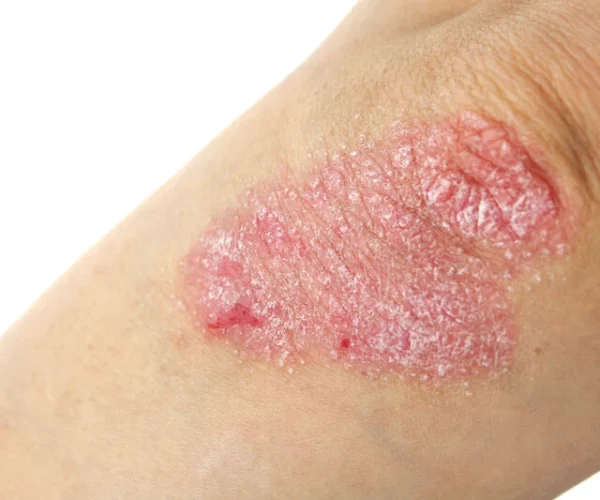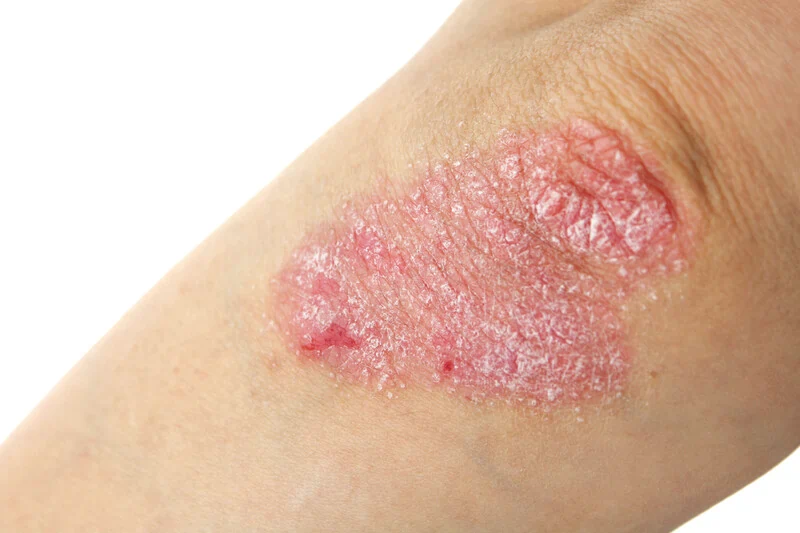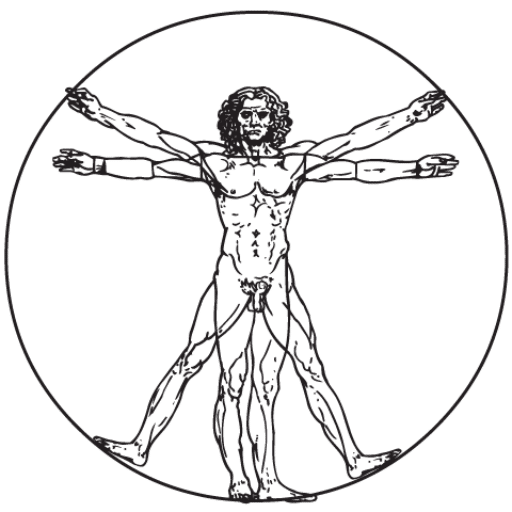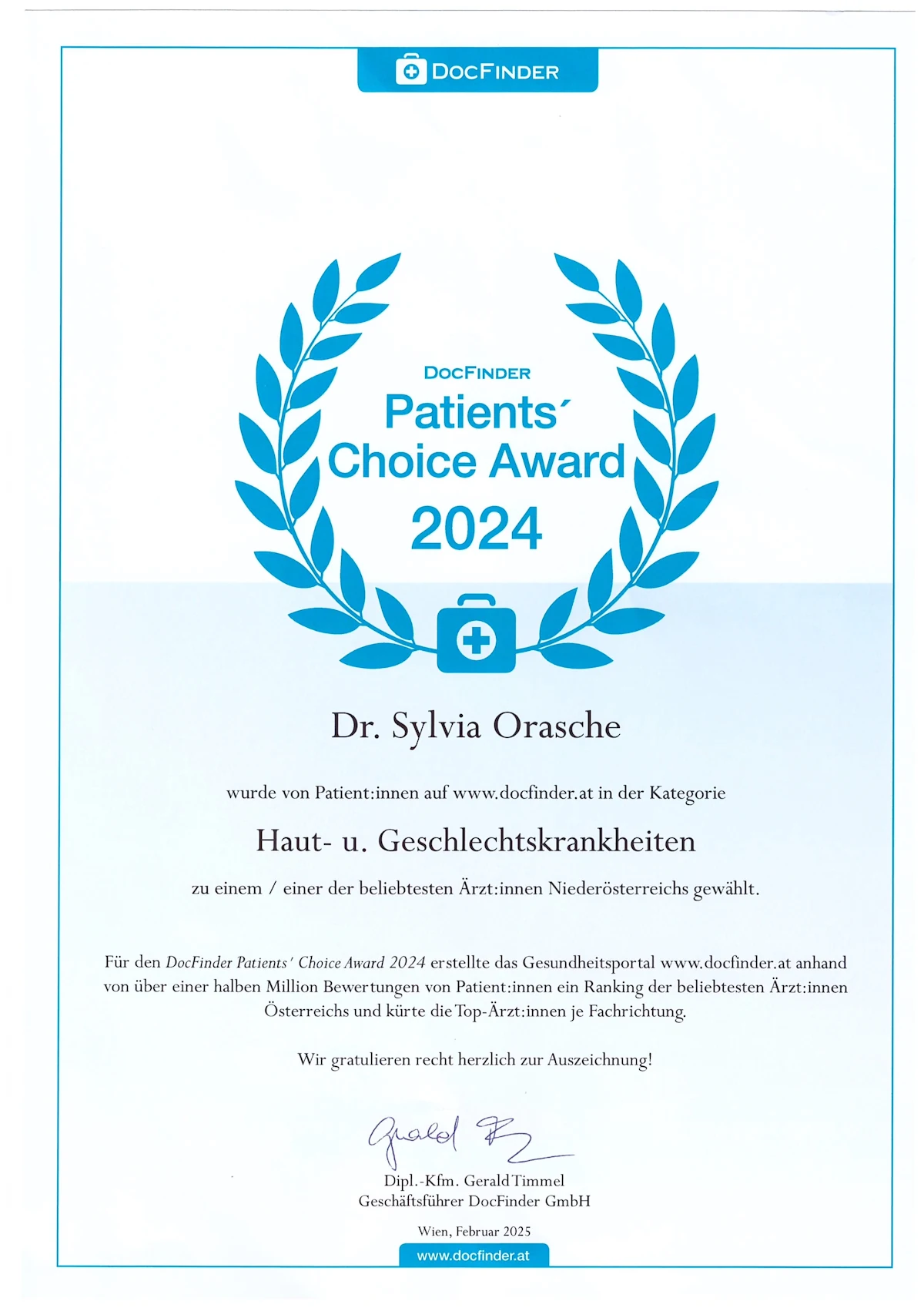Neurodermatitis treatment
The aim of atopic dermatitis treatment is to alleviate the symptoms, improve the quality of life of those affected and prevent or minimise flare-ups.
- Rapid relief from itching
- Strengthening and restoring the skin barrier
- Identification and avoidance of triggers

Table of contents
Overview of neurodermatitis treatments
Topical treatment (basic therapy): Application of moisturisers and prescription creams.
Laser treatments: Targeted reduction of eczema using laser.
UV therapy: Controlled irradiation with ultraviolet light.
Effective atopic dermatitis treatment requires continuous care and monitoring of the skin. This is necessary to prevent flare-ups and strengthen the skin barrier.
Acute flare-ups can be alleviated within a few weeks through targeted treatment.
Improving the quality of life: By effectively controlling the symptoms, those affected should be able to lead as normal and symptom-free a life as possible.
First ordination: 180,- €
Treatment: ab 190,- €*
We create a customised treatment plan for you with a precise cost plan.
*Guide prices: Treatment costs depend on the method and number of sessions. There are also variable costs depending on specific lifestyle changes and additional treatments.
Atopic dermatitis
Neurodermatitis (atopic dermatitis) is one of the most common chronic inflammatory skin diseases. It is based on an overreaction of the immune system in combination with a permeable barrier of the skin and affects about 5 % to 15 % of the population.
It is a non-infectious, relapsing skin disease with a defensive reaction to substances that are actually harmless. This leads to an excessive formation of immunoglobulin E antibodies. The skin is very dry and cracked. The inflamed areas are accompanied by excruciating itching.
What are the causes of neurodermatitis?
The causes are still not fully understood.
Neurodermatitis often occurs together with other diseases from the "atopic group", such as asthma or hay fever. Due to a mostly genetic predisposition, those affected react excessively to certain substances. The reaction of the skin is caused by cytokines, which are messenger substances that activate certain defence cells. This leads to an increased release of histamine, which causes inflammation and itching of the skin.
What are the typical symptoms of neurodermatitis?
Characteristic symptoms are reddened and inflamed skin areas that itch intensely.
In the acute stage, the skin begins to redden. The itching is so intense that the affected person scratches the skin, which leads to bleeding skin, infections and thus to even worse itching. The inflammation spreads over a large area.
Most often, the skin is very dry and prone to the formation of eczema. Atopic dermatitis, as this disease is also called, occurs in episodes.
Triggers of atopic dermatitis
There are many factors (triggers) that trigger a neurodermatitis flare-up. They can be care products, chemical substances, clothing, an infection, but also stress. People with atopic dermatitis are often prone to depression or anxiety. There is often more to atypical dermatitis than the eczema on the skin.
The skin of affected patients is particularly sensitive in winter, when the skin also dries out due to cold and wind.
Neurodermatitis can occur at any age. If it develops in infancy, the skin changes typically appear in areas of the body such as the elbows, the back of the knees or in the eyelids. In infancy, it is manifested by itchy blisters on the cheeks and scalp.

Neurodermatitis treatment in Vienna:
Dr. Orasche offers in the surgeries in 1180 Vienna and in Tulln offers various treatments to alleviate neurodermatitis. A specific treatment is developed for each patient. Tailor-made therapy plan created.
Basic therapy
The basic therapy includes the regular application of a nourishing skin cream that allows the skin to be re-fatted. In an acute episode, anti-allergic (anti-itch) ointments or anti-inflammatory agents (topical cortisone ointment) are administered, depending on the location of the symptoms. In special cases, allergy tablets, anti-inflammatory drugs or infusions may also be necessary.
Neurodermatitis treatment with UV light
Phototherapy with ultraviolet light is now part of the fixed repertoire of neurodermatitis therapy. The UV light can calm the immune system of the uppermost skin layers and fight the inflammations.
Treat neurodermatitis with laser
Chronic atopic eczema can additionally be treated with the Excimer laser can be treated. Here, the laser light is used to treat the inflammation and the thickened skin.
Usually, a combination of different treatments leads to long-term success.
Tips for patients with neurodermatitis:
- Do not use real soaps, only ph-neutral washing lotion.
- Showering is better than bathing - use a moisturising cream afterwards.
- Water that is too hot promotes itching
- Avoid clothes made of real wool - better quality cotton products
- A change of climate often has a positive effect (ideal: high mountains, Dead Sea, Atlantic)
- Chlorinated water in swimming pools irritates the skin
- Tattoos are taboo for neurodermatitis patients
Frequently asked questions about neurodermatitis
Is neurodermatitis curable?
Unfortunately, neurodermatitis cannot be cured. The predisposition to it remains throughout life. However, treatment can often lead to symptom-free phases lasting for years. In the long term, it makes sense to find the triggers of atopic dermatitis through an allergy test.
Does diet play a role in atopic dermatitis?
Foods are rather rare triggers of neurodermatitis.
There is no special diet. Some studies have shown that additional vitamin D and vitamin E supplementation can improve symptoms.
People who are allergic to birch pollen may develop a cross-allergy after eating apples, kiwis, peanuts or peaches, which can also contribute to the skin reacting with eczema and itching. In this case, the immune system reacts to the protein bet-v-1, which is found in pollen as well as in certain fruits or vegetables.
How can I relieve itching and inflammation with atopic dermatitis?
Corticosteroids and calcineurin inhibitors in the form of creams or ointments are often used to relieve itching and inflammation. Moisturising creams help to hydrate the skin and improve the barrier function. Cold compresses and antihistamines can also help to reduce itching.
Can atopic dermatitis be cured and how is long-term care organised?
Atopic dermatitis cannot be cured, but it can be managed effectively. Long-term care includes daily application of moisturisers, avoidance of triggers, regular medical check-ups and, if necessary, the use of medication to control symptoms and prevent flare-ups.
Patient testimonials
In summary, I can say: very good and competent advice from a nice and empathetic doctor; nice team; no long waiting times. I will be very happy to come back!



